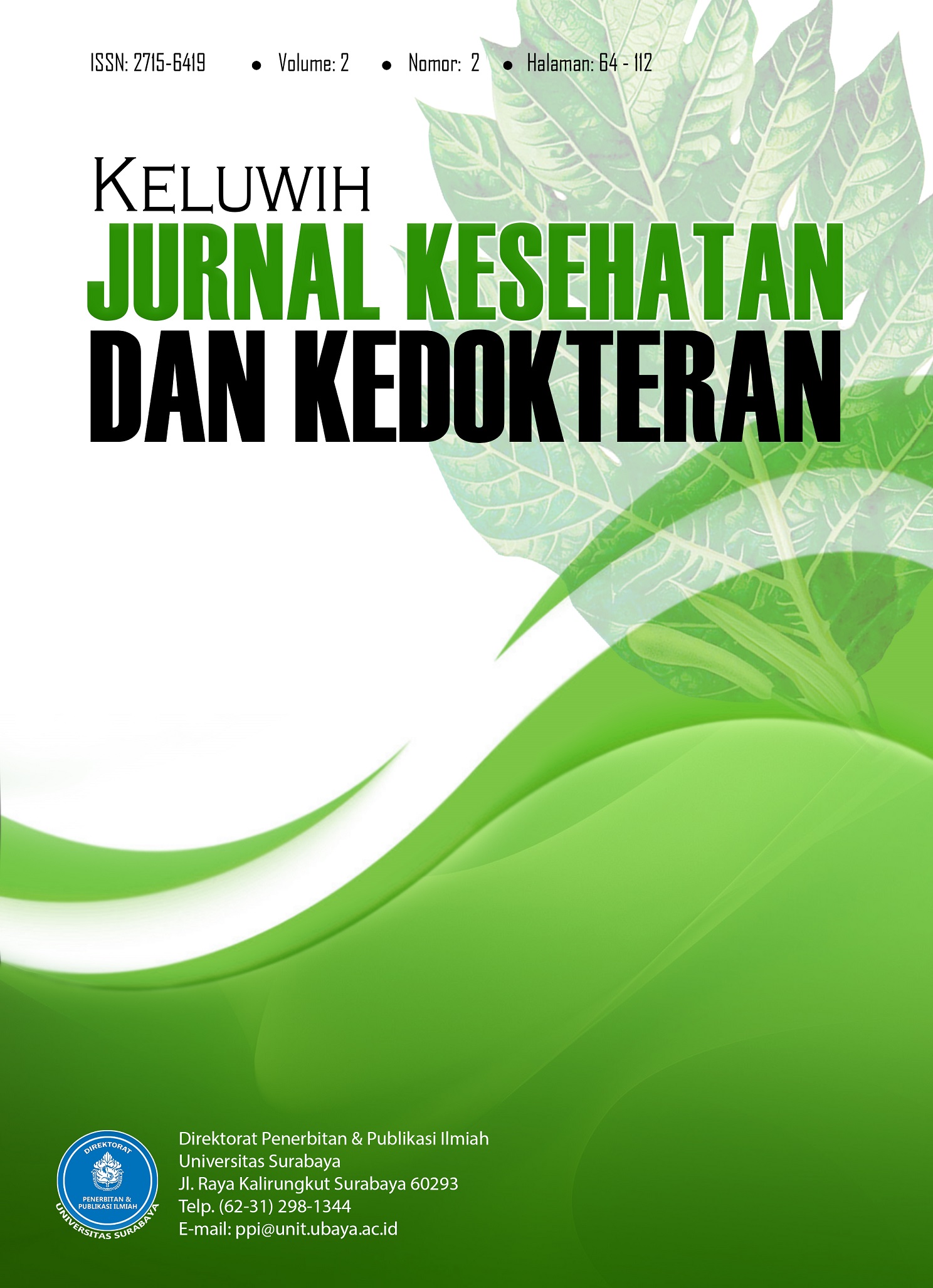Persepsi Apoteker terhadap Apoteker Online di Wilayah Surabaya Timur
Pharmacists' Perceptions of Online Pharmacy in the East Surabaya Area
 Abstract Views:
1243 times
Abstract Views:
1243 times
 PDF Downloads:
1934 times
PDF Downloads:
1934 times
Abstract
Abstract—Indonesia currently does not have regulations regarding the sale of drugs through online media, including online pharmacies. However, face to face with pharmacists and patients is very important, because through online media there are no requirements or restrictions that regulate so as to guarantee safety to the public and avoid misuse of drugs sold through online media. This study used a cross-sectional design with a purposive sampling method. Collecting data in this study through interviews using a questionnaire to determine pharmacists' perceptions of online pharmacies in Indonesia. In this study. The number of respondents involved was 100 pharmacists. Most of the respondents' perceptions gave positive perceptions, both on the quality assurance of medicines and pharmaceutical services. Respondents also agreed on the advantages of purchasing via online, such as easy access, saving time, and completeness of information. However, respondents also agreed that there were drawbacks from online purchases such as the risk of authenticity of drugs, limited information, and drug misuse. Pharmacists view online pharmacies as opportunities for drug sales but also at risk of drug abuse if they are not regulated by government regulations.
Keywords: pharmacist perception, online pharmacy
Abstrak— Indonesia saat ini belum memiliki regulasi terkait dengan penjualan obat melalui media online, termasuk apotek online. Namun tatap muka apoteker dan pasien sangat penting dilakukan, karena melalui media online tanpa ada persyaratan atau pembatasan yang mengatur sehingga untuk memberikan jaminan keselamatan kepada masyarakat dan menghindari penyalahgunaan obat yang dijual melalui media online. Penelitian ini menggunakan desain cross-sectional dengan metode purposive sampling. Pengumpulan data dalam penelitian ini melalui wawancara menggunakan kuesioner untuk mengetahui persepsi apoteker terhadap apotek online di Indonesia. Pada penelitian ini sampel difokuskan dengan metode non-random sampling dengan menggunakan teknik purposive sampling. Jumlah responden yang terlibat adalah 100 orang apoteker. Persepsi responden sebagaian besar memberikan persepsi positif, baik pada jaminan kualitas mutu obat dan pelayanan kefarmasian. Responden juga menyetujui adanya keuntungan pembelian via online, seperti kemudahan akses, hemat waktu, dan kelengkapan informasi. Namun responden juga menyetujui adanya kekurangan dari pembelian online seperti risiko keaslian obat, keterbatasan informasi, dan penyalahgunaan obat. Apoteker memandang apotek online sebagai peluang dalam penjualan obat namun juga berisiko penyalahgunaan obat bila tidak diatur dalam regulasi pemerintah.
Kata kunci: persepsi apoteker, apotek online
Downloads
References
Apavaloaie EI. Emerging Markets Queries in Finance and Business: The impact of the Internet on the business environment. Procedia Economics and Finance. 2014;15:951‒8.
APJII (Asosiasi Penyelenggara Jasa Internet Indonesia). Saatnya jadi Pokok Perhatian Pemerintah dan Industri. 2016.;(5):1‒7. https://apjii.or.id/downfile/file/BULETINAPJIIEDISI05November2016.pdf
Ariyulinda N. Urgensi Pembentukan Regulasi Penjualan Obat Melalui Media Online. Jurnal Legislasi Indonesia. 2018;15(1):37‒48.
Bennadi D. Self-medication: A current challenge. J Basic Clin Pharm. 2013;5(1):19‒23.
Bishop AC, Boyle TA, Morrison B, et al. Public perceptions of pharmacist expanded scope of practice services in Nova Scotia. Can Pharm J (Ott). 2015;148(5):274‒83.
BPOM. Focus Group Discussion (FGD) terkait Pasar Aman dari Bahan Berbahaya di Kalimantan Tengah. 2020. https://www.pom.go.id/new/view/more/berita/16379/Focus-Group-Discussion--FGD--terkait-Pasar-Aman-dari-Bahan-Berbahaya-di-Kalimantan-Tengah-.html
Carbon CC. Understanding human perception by human-made illusions. Front Hum Neurosci. 2014;8:566.
Desai C. Online pharmacies: A boon or bane?. Indian J Pharmacol. 2016;48(6):615‒6.
Haase CM, Silbereisen RK. Effects of positive affect on risk perceptions in adolescence and young adulthood. J Adolesc. 2011;34(1):29-37.
Hapsari SD, Ekasari MP, Kristina SA. 2018. Persepsi Apoteker Tentang Apotek Online Di Indonesia. Skripsi S1 tidak dipublikasikan.
Hugtenburg JG, Timmers L, Elders PJ, Vervloet M, van Dijk L. Definitions, variants, and causes of nonadherence with medication: a challenge for tailored interventions. Patient Prefer Adherence. 2013;7:675‒82.
Ilardo ML, Speciale A. The Community Pharmacist: Perceived Barriers and Patient-Centered Care Communication. Int J Environ Res Public Health. 2020;17(2):536.
Joshi A, Meza J, Costa S, Puricelli Perin DM, Trout K, Rayamajih A. The role of information and communication technology in community outreach, academic and research collaboration, and education and support services (IT-CARES). Perspect Health Inf Manag. 2013;10(Fall):1g.
KOMINFO. Pengguna Internet Indonesia Nomor Enam Dunia. 2014a. https://kominfo.go.id/content/detail/4286/pengguna-internet-indonesia-nomor-enam-dunia/0/sorotan_media
KOMINFO. BPOM Tutup 129 Situs Penjual Obat Ilegal. 2014b. https://kominfo.go.id/index.php/content/detail/3734/BPOM+Tutup+129+Situs+Penjual+Obat+Ilegal/0/sorotan_media
Lorensia A, Yudiarso A, Safina N. Pharmacist Perception of Barriers in Pharmaceutical Services for Asthma Disease in Pharmacies. Jurnal Sains dan Kesehatan. 2020.
Ofori-Asenso R, Agyeman AA. Irrational Use of Medicines-A Summary of Key Concepts. Pharmacy (Basel). 2016;4(4):35.
Ong SW, Hassali MA, Saleem F. Community pharmacists' perceptions towards online health information in Kuala Lumpur, Malaysia. Pharm Pract (Granada). 2018;16(2):1166.
Svorc, J. Consumer ‟ s Intentions to Shop Medicaments Online: A Survey from Czech Republic Market. Journal of System Integration. 2012;(2):3–28.
Tran LTT. Managing the effectiveness of e-commerce platforms in a pandemic. Journal of Retailing and Consumer Services. 2020;58:102287.
Ventola CL. Direct-to-Consumer Pharmaceutical Advertising: Therapeutic or Toxic?. P T. 2011;36(10):669-684.

This work is licensed under a Creative Commons Attribution-ShareAlike 4.0 International License.
- Articles published in Keluwih: JKK are licensed under a Creative Commons Attribution-ShareAlike 4.0 International license. You are free to copy, transform, or redistribute articles for any lawful purpose in any medium, provided you give appropriate credit to the original author(s) and the journal, link to the license, indicate if changes were made, and redistribute any derivative work under the same license.
- Copyright on articles is retained by the respective author(s), without restrictions. A non-exclusive license is granted to Kluwih: JKK to publish the article and identify itself as its original publisher, along with the commercial right to include the article in a hardcopy issue for sale to libraries and individuals.
- By publishing in Keluwih: JKK, authors grant any third party the right to use their article to the extent provided by the Creative Commons Attribution-ShareAlike 4.0 International license.

 DOI:
DOI:






